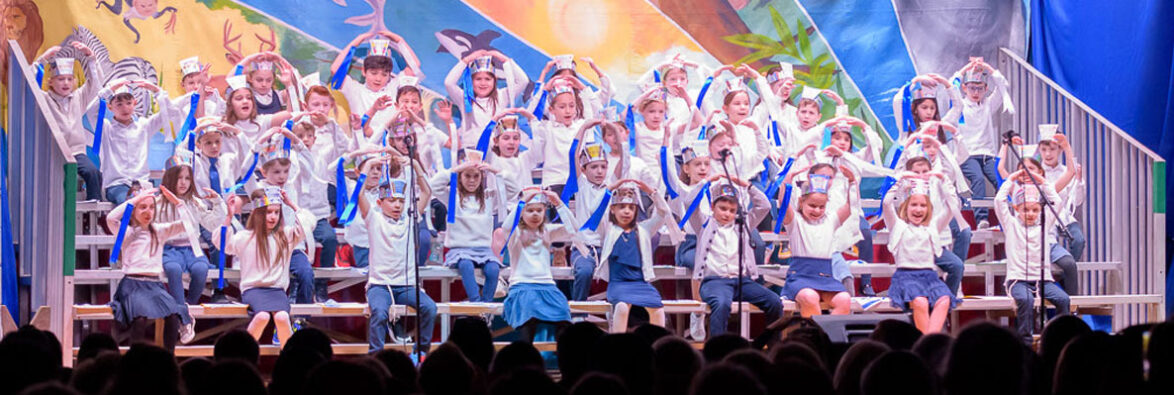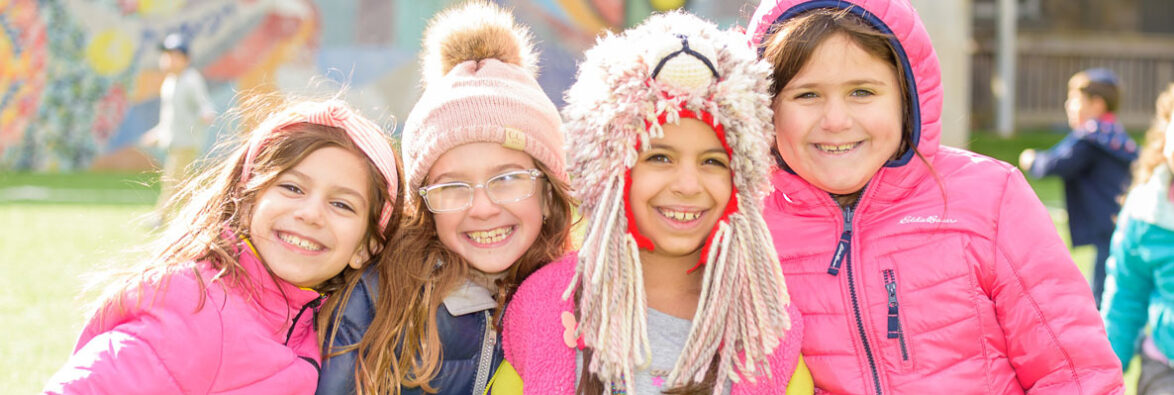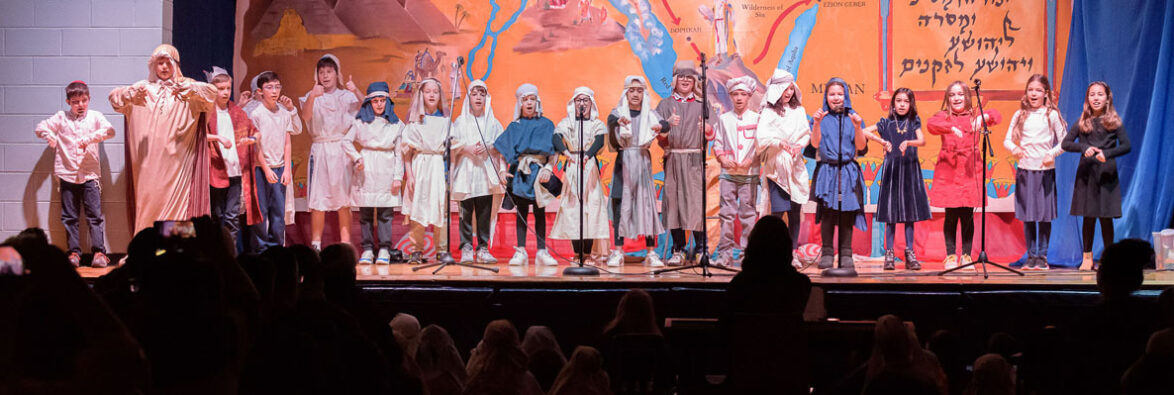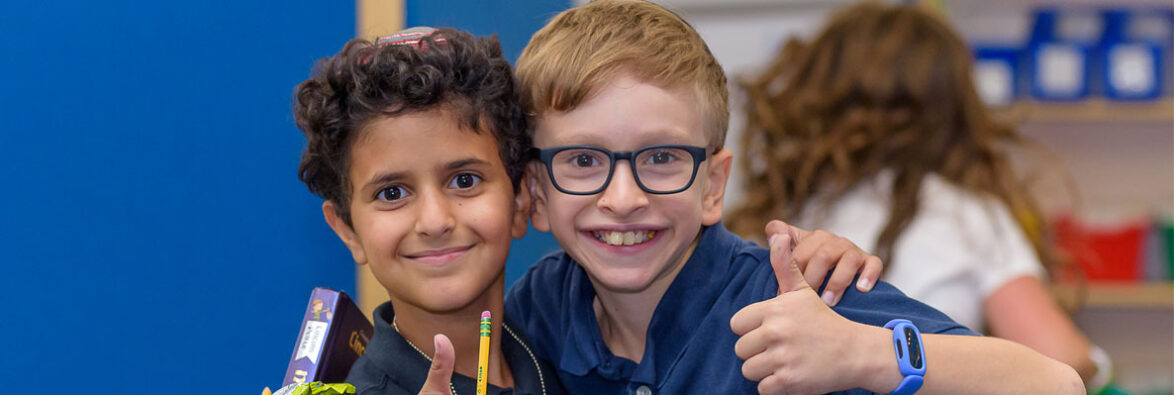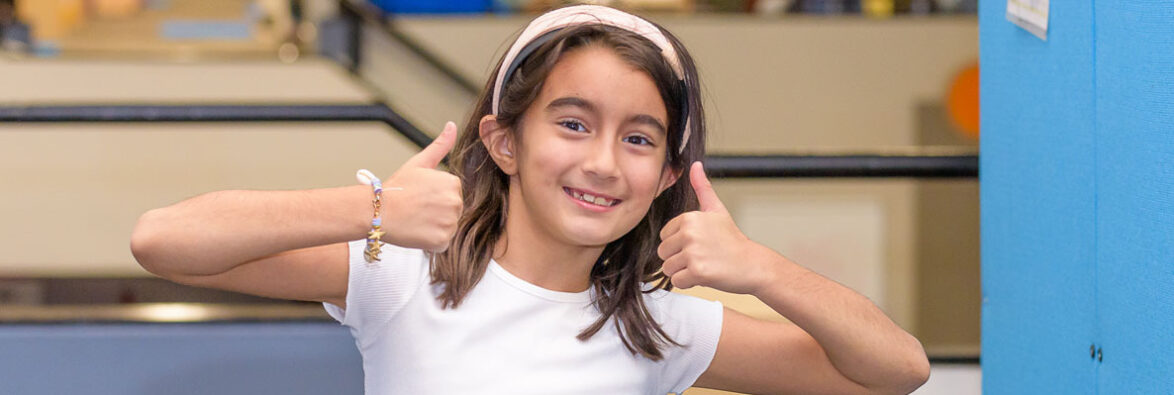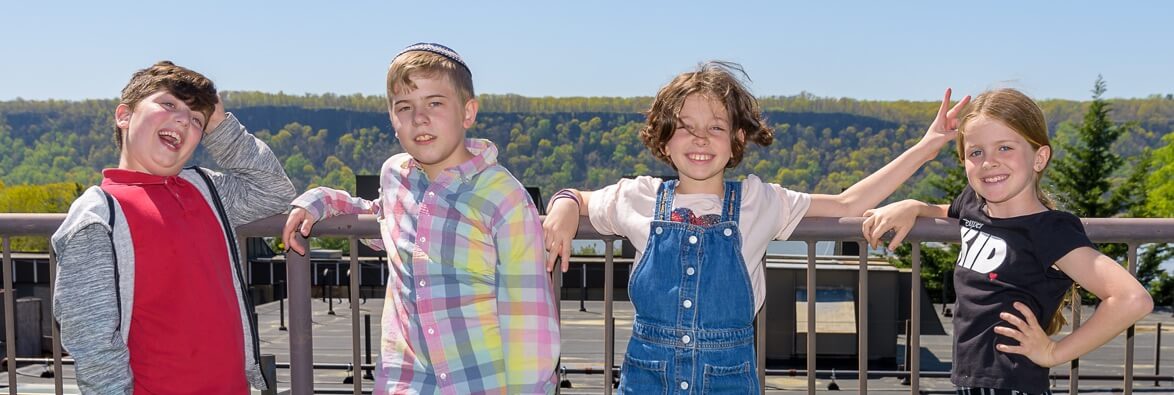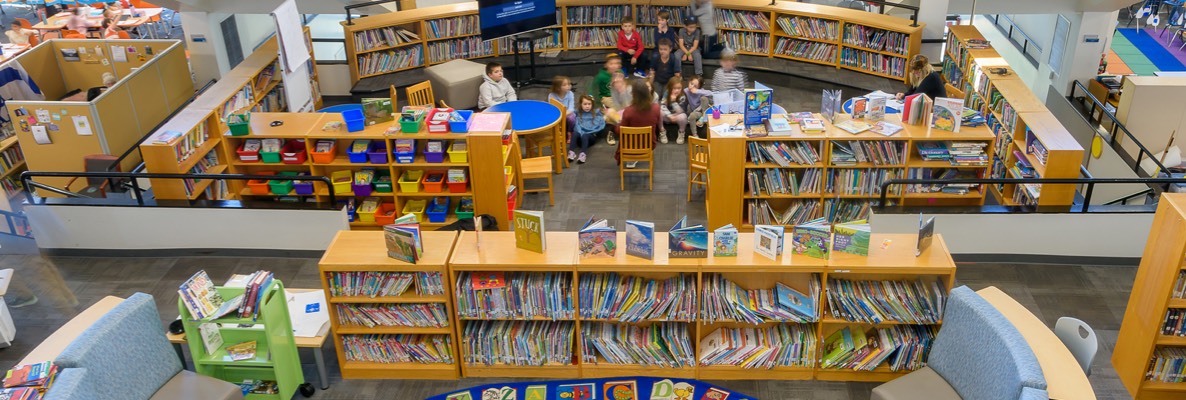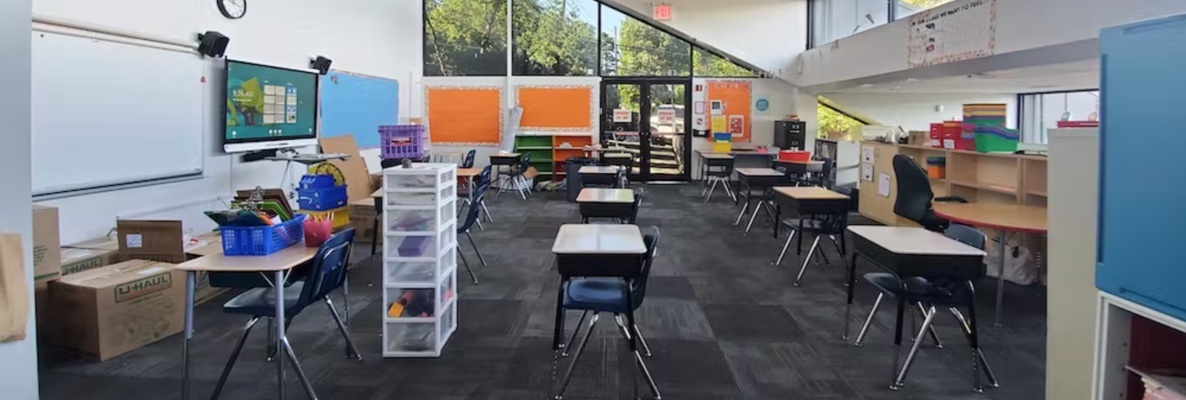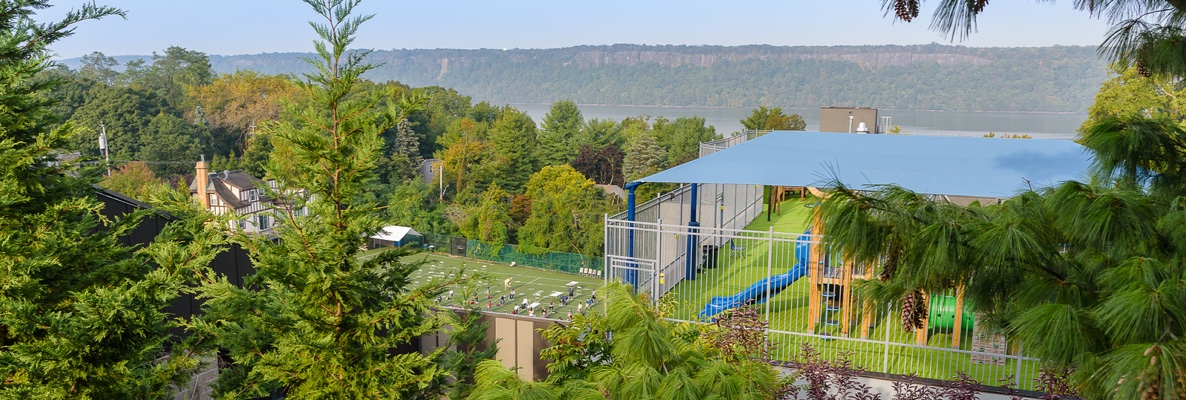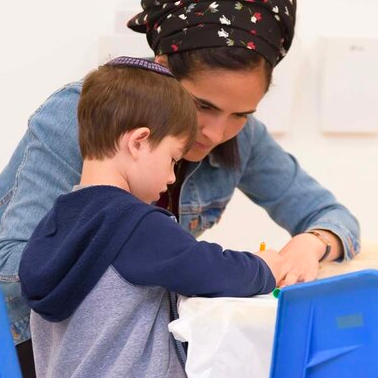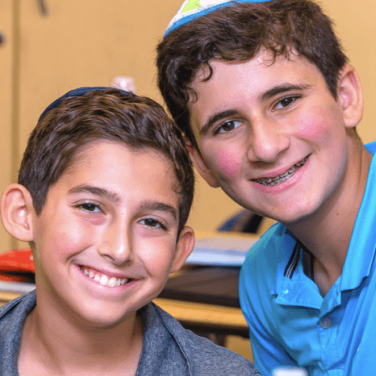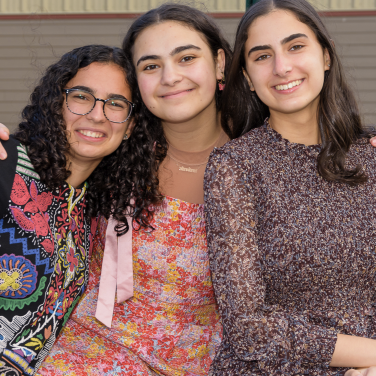Lower School
In grades 1-8, we open our students’ minds to history, literature, math, science, tefillah, and Medinat Yisrael – all through the lens of Torah. Our secular and Judaic curricula are both academically challenging and developmentally appropriate. We nurture in our children the understanding that Torah informs who we are in all of our interactions, and how we hold ourselves in the world.
Lower School Curriculum
-
Jewish Living and Learning
Every day, we live Judaism joyfully—interacting with one another and the world at large in ways that reflect respect, collaboration, and a shared commitment to Torah and mitzvot. In order to experience all that we teach, SAR has a longstanding tradition of holding school during Chol HaMoed Sukkot, Chanukah, and Purim. Our school days enhance each chag by giving us the opportunity to celebrate and learn in experiential ways, from sukkah hopping on Sukkot in the neighborhood to sharing in a school-wide candle lighting on Chanukah, to singing Hallel together on the famous SAR steps on Yom Ha’atzmaut, to gathering in costume on Purim to hear our Middle School students, both boys and girls, read Megillat Esther. Every Rosh Chodesh, we strive to create an environment that celebrates the unique spirit of the day. We ask students to dress in blue and white (on the first day of Rosh Chodesh when it is two days) on these days.
Tefillah
Developing deep connections to Hashem is a paramount value at SAR. Children participate in daily tefillah. They learn both the mechanics related to davening and the meaning behind the words so that they can communicate with Hashem each day in a meaningful and spiritual way. Building upon the foundation created in the ELC, the Lower School follows a spiral curriculum in which we add tefillot each year, focusing on quality and understanding of the tefillot that we say.
Jewish Texts
Learning the weekly Parashat haShavua is an integral component of the Judaic Studies program. It is taught in a comprehensive and creative way, both in and out of the classroom. On Fridays, the Lower School students gather by grade to learn about the parsha with our Lower School Associate Principal of Judaic Studies Sharon Richter (AKA Morah Sarah). Our 3rd graders learn a weekly Rashi question and answer that relates to the parsha. Our 5th graders review the story, and then learn a dvar Torah that connects to a teaching related to Torah sh’baal Peh.
Throughout the year, our students engage in hands-on experiences that connect to — and elevate — their Judaic Studies lessons. Students perform acts of chesed in our chesed tent in honor of Parshat Vayera. They have an intergenerational Torah experience when they come together with their parents and grandparents to explore Jewish texts at a Rashi celebration. Our students are charged with learning the texts of the Torah and spend time in their classes deciphering the text and exploring it.
Each year’s curriculum builds upon the previous one. In 2nd grade, we begin teaching Chumash to the students. In 3rd grade, the students start to learn Rashi and are offered a Ta’amei Hamikra course, which allows them to learn the punctuation and trope of the Torah to enhance their understanding of it. In 4th grade, we introduce Navi and in 5th grade, the students learn Mishna. At the start of 6th grade, the students start learning Gemara.
All Judaic classes follow the “Ivrit b’Ivrit” model, which means the teachers speak solely in Hebrew, but also in a dynamic and interactive way that ensures the students understand what is being communicated. This allows the students to both enhance their Hebrew language skills and to approach the text with independence. (In Middle School, students who are not proficient in Hebrew are able to take Judaic’s classes that are primarily taught in English.)
-
Literacy and Language Development
Students in grades 1-4 engage in systematic phonics and spelling instruction through Fundations, Words Their Way, or through the multisensory Orton Gillingham-based program. All are systematic methods for building phonemic awareness, fluency, handwriting, and spelling. Because reading is a complex process that extends beyond the ability to decode individual words and sentences, phonics is taught in conjunction with a core literature-based approach. At SAR, we achieve this through Reading Workshop and the Teachers’ College Reading Units of Study. Recognizing that no two children learn to read at the same pace or in precisely the same way, Reading Workshop is designed to meet the diverse interests, strengths, and needs of each individual. Key elements include:
Mini-Lesson & Guided Practice: Reading skills and strategies are modeled, including word attack, fluency, analysis of story elements, and author’s craft, and students practice with partners using a shared text.
Independent Reading and Conferencing: Students apply what they have learned to books of their choosing, while teachers meet with them individually or in small groups.
Sharing and Reflection: Students discuss and write about the books they are reading.
Interactive Read-Aloud: Teachers read to the whole group and facilitate discussion, with a focus on identifying literary elements, key ideas, and text features that support comprehension. Students predict, draw inferences, make connections to other texts, and synthesize what they know. We utilize “The Writing Revolution” methodology to teach expository writing skills. The instruction sets out to make the enormously complex process of writing transparent and accessible for students. Skills are modeled, taught and practiced through direct, explicit instruction. Across the grades, this approach enriches a child’s ability to write personal narratives and creative writing as well, and is implemented across content areas. For example, in social studies, each grade focuses on different thematic units of study and utilizes writing skills to express their areas of learning, including values of diversity, inclusion, and making room for multiple perspectives.
-
Math and Science
Lower School Science
Lower School Science is taught using an inquiry-based curriculum that aims to inspire students to love science. We teach and encourage such scientific practices as asking questions and defining problems, developing and using models, carrying out investigations, analyzing and interpreting data, and supporting arguments with evidence. Students also learn to recognize the importance of patterns, identify and understand cause and effect, and utilize appropriate tools to make accurate measurements and observations. They also engage in the engineering design process throughout the year, as they are challenged to design and create a product related to the curricular content.
Lower School Math
The Singapore Math method approaches mathematical concepts in a deep and sustainable way, by emphasizing critical thinking skills, metacognition, and problem-solving to develop mathematical reasoning. Singapore Math uses visuals extensively, and model-drawing in particular to help students visually represent information in a problem so they can understand the meaning and how to solve it. Building number sense and using mental math strategies is a strong focus of Singapore Math. Strategies such as part-whole thinking and breaking numbers into decomposed parts or friendlier numbers that are easier to work with, allowing students to manipulate numbers in their heads without using paper and pencil.
-
Hebrew Immersion and Israel
Hebrew Immersion
To help our students develop a proficiency and eventually, a mastery of the Hebrew language, we employ the “Ivrit B’Ivrit” model. Throughout the school day, the designated head Hebrew teacher speaks solely in Hebrew in a dynamic and demonstrative way to ensure students are able to fully comprehend what is being communicated. This enables the students to have a comprehensive language immersion experience, which is proven to enhance language acquisition.
Our ultimate goal is to prepare and empower students to confidently and adeptly access text, converse in everyday Hebrew, and bring to life the language of our people and our land.
SAR uses the iTaLAM digital blended learning curriculum, an engaging and adaptive program featuring online games, interactive stories, and songs.
Students learn in a variety of ways, through songs, stories, pictures, body language, creative games and more to advance their proficiency. During daily morning and afternoon meetings, students greet one another in Hebrew, play group games in Hebrew, and share experiences and happenings in their lives in Hebrew. At points during the school day, students also break out into small Hebrew reading groups to provide intimate and manageable opportunities to read and express themselves.
Our teachers employ visual prompts to help students secure new vocabulary and concepts. For example, teachers post “sentence starters” in every classroom. As students “turn and talk” to one another to answer questions, they respond in chorus and are encouraged to lengthen their utterances when they speak.
SAR students don’t stop learning Hebrew and Judaics at the close of the school day. The school offers extra learning opportunities outside of the classroom, too. We offer an evening Zoom Hebrew book club and a Mishna Yomi learning program, which is a wonderful way to build the-home-to-school learning partnership and model the centrality of Torah in our lives. We have four Hebrew poetry contests throughout the year, which encourage the students to write creatively and poignantly in Hebrew.
Hebrew reading groups provide opportunities for students to read and express themselves in Hebrew in a smaller group setting.
Israel
One of our core values at SAR is to help foster a deep love of, support of, and connection to Medinat Yisrael. We accomplish this both within our Judaic Studies and General Studies lessons and outside of our formal learning environment. We teach a dedicated Israel curriculum, developed by the Lookstein Center at Bar Ilan University, taught throughout the year in Grades 1-8; hands-on lessons about ancient and modern Israeli history; discussions about current events in Israel; streams of blue and white clothing on Rosh Chodesh; chagigot, daglanut, and a community barbeque on Yom Ha’Atzmaut; a solemn, student-led ceremony on Yom HaZikaron to honor victims of terror and chayalim who have lost their lives while defending Medinat Yisrael; and more.
-
Beyond the Classroom
In-School Events
We welcome parents and extended family to SAR Academy to honor milestones and special programs throughout the year, including:
Grade 1: Siddur Play, Math Fair
Grade 2: Chumash Play
Grade 3: Wacky Wax Museum, Rashi Breakfast
Grade 4: Navi Celebration, American History Program
Grade 5: Leil Dor L’Dor
School Trips
Students may embark on various field trips, which help bring their classroom curricula to life, including visits to museums, zoos, parks, gardens, courthouses and parades as well as other locations in order to take their studies from theory to practice.
After-School Activities:
SAR offers a wide range of after-school activities that are available to students in Kindergarten through Grade 8. These programs provide perfect ways to socialize, have fun and learn something new. Since the after-school programs are designed to be age-appropriate, available activities vary by grade level. Activities are offered for two sessions, September to February and February to June, each requiring a new registration.
-
Pisgah at SAR
At SAR, we believe in creating a culture and infrastructure of inclusion and are committed to supporting the growth and learning needs of ALL children. Pisgah offers a hybrid approach allowing students to receive the support they need while also allowing for them to be in a general classroom setting. Each Pisgah cohort consists of a small group model of generally no more than five students. A team made up of a Special Education teacher, General Education teacher, Speech Pathologist, Behaviorist, and Occupational Therapist work together to create goals for each individual student. Once goals are set, a schedule is created with a mix of push-in and pull-out remedial services to support the child toward meeting those goals. This methodology allows for strong peer models, access to a rich, robust curriculum, and the intensive support a student may need.
The Pisgah Program has two tracks:- Language-Based Learning Disabilities/Dyslexia Track: For some students, language-based learning disabilities, including dyslexia, interfere with their ability to learn to read and write with ease.
- Sensory Integration and Executive Function Track: For some students, social and emotional learning challenges, including sensory integration and executive function deficits, result in a level of dysregulation that interferes with their ability to reach their potential academically and/or socially.
Pisgah is the Hebrew word for summit, and reflects SAR’s commitment to ensuring that students are given the support they need to climb their own personal mountain and reach their own personal summit in an educationally and socially supportive community environment.
Specialties & Co-Curriculars
Students in grades 1-5 attend Arts & STEM Specialties during the same period of the day Monday through Thursday and will have a Specialty each day. All specialty teachers work cohesively together, as well as with classroom teachers, to integrate what is being learned into all areas of the curriculum. Each student has one art, one music, two STEM, one LITT (Library Integrated Torah & Technology) class (Grades 1 & 2), opportunities to hear book promos and/or visit the library (Grades 3-5), and two STEM classes. Special art and special STEM projects are offered intermittently on Fridays.
-
STEM
We offer a wide array of STEM (Science, Technology, Engineering, and Math) opportunities
to better prepare our students of all ages for the 21st century. STEM activities range from
curricular enhancements within the classrooms to specialties during the school day and
electives offered as after school programming.Fairy Tale Engineering in Grades 1 & 2: After reading a short fairy tale or story, students
are challenged to solve a problem presented in the literature using simple engineering skills.Coding and Robotics in Grades 1-3: Students program puzzles, robots, and animations using block-based coding software, encouraging planning, collaboration, logical thinking, and problem solving.
Coding and Robotics in Grades 4-5: Students use Scratch platform to create interactive cards and games while learning to plan, debug and use computational concepts. Students take their creations into the physical world by connecting code to Makey Makey’s and Microbits. Students also explore 3D design using Tinkercad, developing proficiency with work planes, alignment and sizing.
NGSS aligned Science Units in Grades 1-5: Students explore topics within Earth/Space, Life and Physical Science integrating engineering design challenges into curricular topics while also learning Science skills such as modeling, collecting and analyzing data, graphing, and finding evidence to support scientific arguments.
-
Music
We are excited about the innovations to our music program:
Grades 1-2 will enjoy comprehensive music class.
Grade 3 studies voice and recorder in our Music Majors Program, culminating in a performance at Carnegie Hall.
Grades 4-5 choose from many Voice and Choice Workshops including Guitar Workshop, Keyboard Konnect, Soundtrack Engineering, Ukelele, Percussion and Drumming and more.
Our after-school choir led by Noah Solomon and Ilan Marans will provide students with numerous performance outlets.
We are excited to add a Junior Choir to our music offerings as well as a Spotify channel housing the music of our students.
-
Art
Our Visual Art program offers challenges in varied media, developed sequentially with technical and interpretive skills increasing at each level, all taking place in our magnificent Art Studio overlooking the Hudson River and Palisades. Our defined art courses are led by practicing artists in their individual disciplines — painter and digital artist, Noel Gussen, painter, fabric artist, and art educator Debbie Greenwald, multi-media artist, sculptor, ceramicist Robin Sheldon, digital animator Bart Atsin, and ceramicist Dan Harelick who will continue to lead his popular, comprehensive, ceramics program in Lower School grades and in the Middle School STEAM program. Middle School students enjoy a rotation of STEAM-based or ARTS-based classes.
Fourth and Fifth Graders will participate in Art Workshops through Voice and Choice including: Music To Canvas, Painting Workshop, Fashion Design, Fabric Art, Animation Studio, Printmaking Studio, Ceramics Studio, Digital iPad Art Workshop, and more. Middle Schoolers will have formalized ARTS programming that includes drawing & painting, ceramics, digital art, and more.
-
LITT-Library Integrated Torah & Technology
Our welcoming library warmly invites students to cultivate their inherent curiosity and develop into life-long learners and lovers of reading and can visit the library at any time. During their earliest years students discern parts of a book, distinguish between fiction and non-fiction, engage in author studies, and select “just-right” books to borrow and enjoy from our rich secular and Judaic holdings. Students will develop basic research skills using school-age friendly platforms such as Brittanica Junior and Pebblego. In 1st and 2nd grades students rotate through the following three offerings: Library Skills Workshop, Fairytale Engineering, and Gan Ilan. Library time will include GRAND Storytime with visits from our students’ GRANDS. Grades 3-4 will be introduced to new literature and classics through Book Promos and are welcome to visit the library through the week to select books.
-
Gan Ilan
Gan Ilan is our magical rooftop garden where children are nurtured as they nurture beautiful things to grow. Grades 1-3 visit Gan Ilan weekly and plant everything from grape vines to flowers. Lessons are led by Grow Torah’s educator Menuchach Shulman and Gan Ilan educator El- Ad Cohen, who bring expertise in environmental education and its connection with Torah. El-Ad brings small animals to Gan Ilan for interactive and learning experiences. Students explore questions such as: What is our role in nature? and “L’ovdah Ul’shomra”: What does it mean to work and protect the land? Gan Ilan donates 90% of our produce to food pantries in the Bronx and Bergen County.
-
Physical Education & Movement
Our motto, “Skills that Last a Lifetime,” indicates our primary objective, establishing and fostering healthy and appropriate social, emotional, cognitive, and physical habits in every child’s development within a fun learning environment through sports, games, movement, and fitness.
All students explore a wide range of physical activities, including various age-appropriate skills related to fitness, manipulatives, sports, movement, creative tasks, and cooperative activities. We use physical activities to teach them how to strategize, interact with each other, and challenge themselves, to name a few.
Grades 1-3: Introduction to lead-up activities and sportsmanship
Students begin to experience lead-up sports skills, cooperative activities, healthy choices, and motor skill development. This stage focuses on grasping the locomotor skills (walking, running, hopping, jumping, side-slide galloping, skipping), hand/eye coordination, tag/cooperative games, social interaction through games, spatial awareness, fine/gross motor development, and basic fitness concepts. This stage emphasizes opportunities for individual success and an appreciation and acceptance of the other’s differences.
Grades 4-5: Advanced movement, Intro to team/ individual sports, and activities.
Students dive into sports and fitness units. They begin to learn concepts and fundamentals of basketball, volleyball, team handball, badminton, soccer, indoor baseball, and cooperative and fitness activities. Basic skills, rules, and terminology of games and sports will be introduced. Sportsmanship and personal improvement will be emphasized, as well as advanced fitness skills.
Elementary Movement
Movement is an opportunity for our students in Grades 1-5 to get moving outside of their PE class and daily recess time. During this recreation period, the students can choose either a more competitive, organized activity led by a Movement instructor or an activity of their choice. This time is focused on developing positive social group skills, critical thinking, communication, and self-expression.
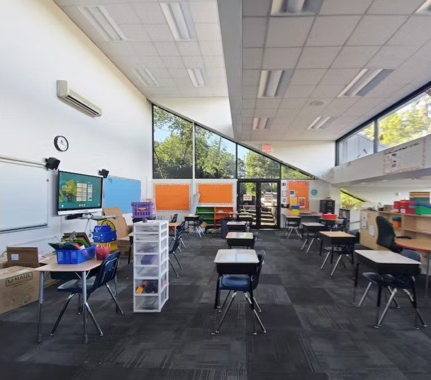
Our Building
Our open architecture is a reflection of our core values. Open spaces, open hearts, open minds.
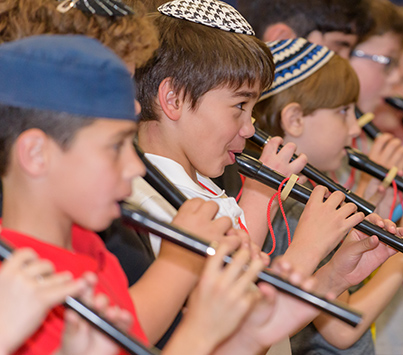
Specialties
Students in grades 1-5 attend Arts & STEM Specialties during the same period of the day Monday through Thursday and will have a Specialty each day.
Our Mission
SAR Academy is a Modern Orthodox co-educational day school dedicated to the belief that every child possesses a divine spark, has unique worth as an individual and should be encouraged to achieve according to his or her ability.
Our Mission
SAR Academy is a Modern Orthodox co-educational day school dedicated to the belief that every child possesses a divine spark, has unique worth as an individual and should be encouraged to achieve according to his or her ability. Our warm environment promotes confidence, creativity and enthusiasm for learning. In our approach to academics, we nurture students to develop intellectual curiosity, critical thinking skills and a lifelong love of both Torah and Secular studies. We have created a program committed to excellence in every aspect of our educational goals:
- To foster a community of b’nai and b’not torah who demonstrate sensitivity for their peers, respect for their teachers and environment, loyalty to their country, and an appreciation of the differences in others.
- To advance and develop each student towards a value and mastery of Hebrew language, Judaic Studies, and General Studies.
- To raise our students’ connection to Hashem (Ahavat Hashem and Yir’at Shamayim), commitment to Talmud Torah, observance of Mitzvot and connection to Medinat Yisrael.
- To educate by nurturing and challenging each student to reach his or her individual potential.

